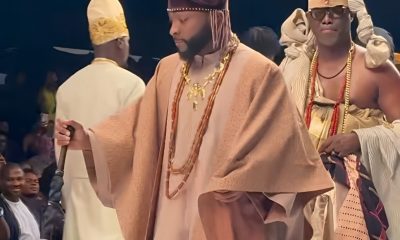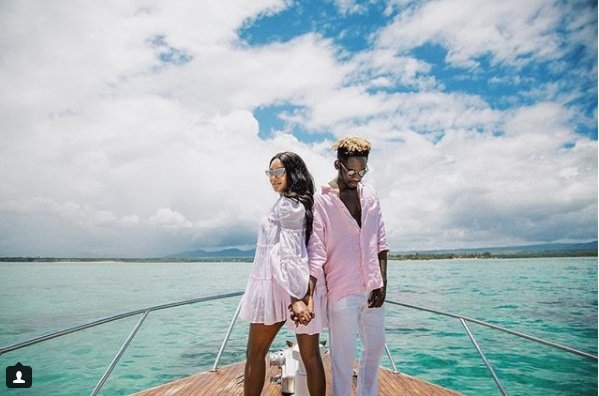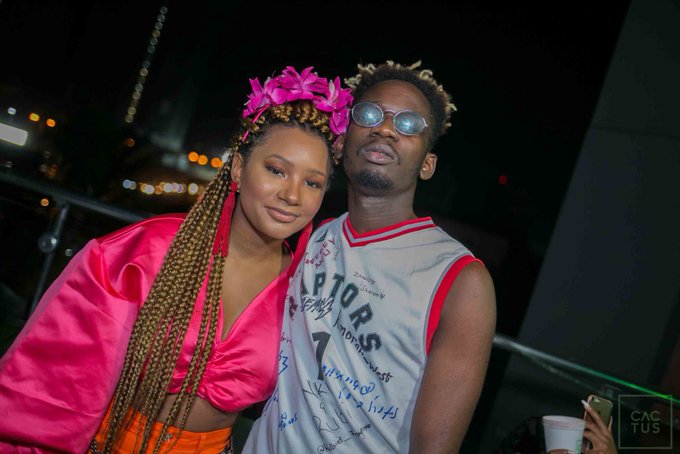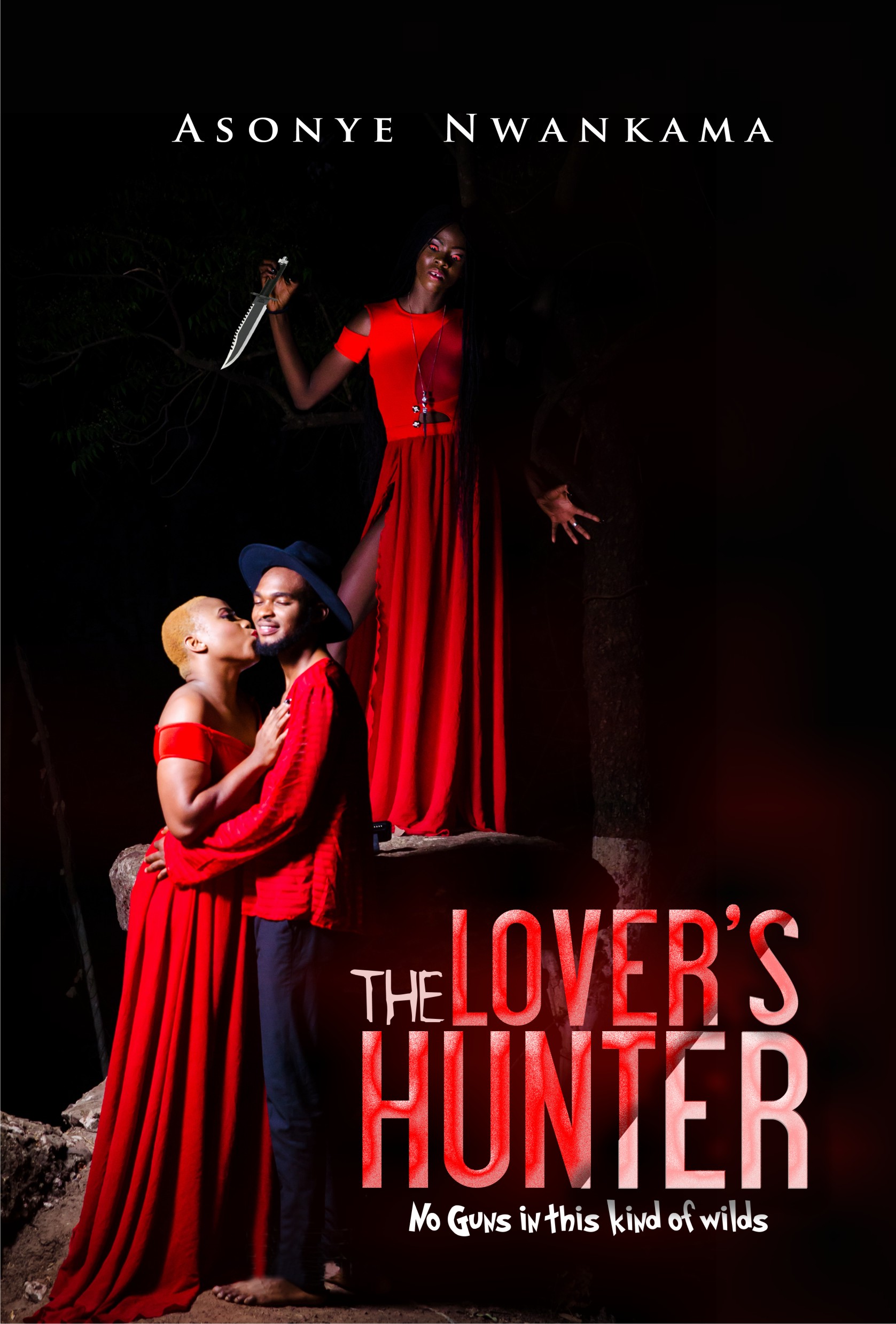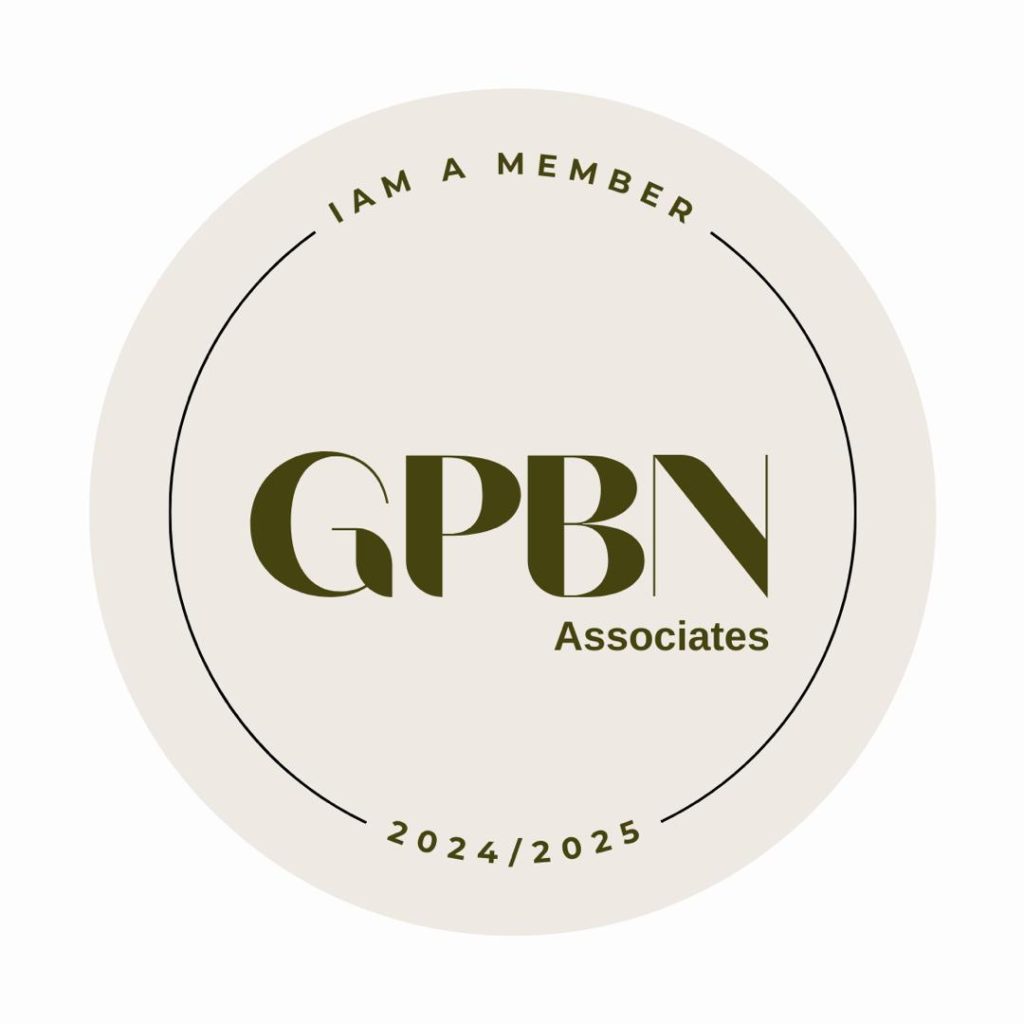Fashion
Fashion Darling Temi Otedola Opens Up About Feminism, Sexuality And Autism
Fresh From Shooting Her Very First A Nasty Boy Cover, Fashion Darling Temi Otedola Opens Up About Feminism, Sexuality And Autism

It’s nearly 24 hours since I emailed Rachel (Temi’s Project Manager), requesting we shoot her as I’d seen she was in Lagos on her Snapchat and Insta-Stories. Temi and I had never met before her shoot with us. In fact, all I knew about her were the much I saw on her Snapchat, Insta-Stories, her blog and the little our mutual friend had shared of their loving memories whenever he went to England. Social Media you see, has played a magnanimous role in positioning Temi as not just a fashion darling but an influencer. Girls want to be like her, and boys too want to count her as a friend. Temi is hugely followed with tens of thousands of engagement per post—but we all know that don’t we? Just like the fact that she isn’t just Temi, but Temi Otedola, a billion-dollar-heiress, sister to Cuppy, and now, girlfriend to one of the biggest players in the Afrobeats genre – Mr Eazi.
But that’s about how much a lot of us know, or have elected to know, ignoring all the other things that she is, completely independent of all these figures in her life!

Dress by Grey / available at Temple Muse
For some strange reason, I was sure Rachel would reply my email with a ‘Sorry, Temi is unavailable to shoot now’ type of reply, or say something about how short-noticed it was; which I’d have understood, I emailed a day into her Lagos trip and knew she was only here for three more days. I messaged my really good friend, who’s friends with her—asking for her exact words when he mentioned A Nasty Boy and our interest in shooting her to her on Snapchat. At this time, we’d gone over this nearly three times, on this third occasion, however, he was not going to reply me anymore. And I understood why: I’d allowed my nerves get the better of me.
The idea of shooting Temi for A Nasty Boy (who in several ways is atypical to our target audience) was because, I, for some reason, have always been puzzled by her. Again, we all know the narrative: Temi Otedola, a billion-dollar-heiress, sister to Cuppy, and now, girlfriend to one of the biggest players in the Afrobeats music game – Mr Eazi, but what I, just like the rest of you had not seen was a totally independent, proudly feminist and issue-driven Temi, and what we don’t know is: beyond her family, and love life, Temi is a full woman. A woman, who may be involved in the stories of those closest to her heart, but is very much a leading lady of a life entirely hers; a tale, completely absent of any of these figures, and a virtual world that she has built from the ground-up at just 21, all by herself!

Ruffled dress by Alexis, Choker by Amrapali Gold / available at Temple Muse
I eventually resolved that Rachel would say no, and Temi will return to England without us shooting her. But all that did not happen. She was very timely as she arrived Temple Muse the venue of our shoot in a really relaxed manner—wearing a Topshop crop-top, Natasha Zinko trackies, Chanel slippers and a Balenciaga bag which she confessed were all her mums. Her face was extremely smooth, silky smooth and glowy, I still find myself lost in the faces of women around me looking for a semblance of that same reflection. I can still recount the entire shoot from the beginning to the end and vice-versa, but what struck me the most was how feminist Temi is. I had no idea, not the slightest!
I remember sharing a few captions we were considering for this cover— Temi, 21, Female and Unreservedly Outspoken, was top on our list. I was excited about the title, I thought she would too, but Temi replied “Could it be proudly female? or if there’s another word to use other than female. Don’t really like that word, as ‘woman’ is the actual word.” I wasn’t sure how to feel, why was she against the word female? Until she mentioned, and until I did some research, I didn’t know that referring to a woman ‘female’ was wrong. Not wrong for the sakes of it, but wrong because the word female is a scientific term that refers to the sex of a species that is capable of producing children, while the term woman refers specifically to human beings. Because reducing a woman to her reproductive abilities is dehumanizing and exclusionary, because nobody casually refers to men as “males”, and because it is most often used to imply inferiority or contempt, according to this BuzzFeedarticle. This one lesson, among many others during the span of my time with Temi, really solidified my respect for her: the 21-year-old woman building an international brand as a fashion influencer and autism awareness advocate!

The following interviews took place during our shoot at Temple Muse—and a series of WhatsApp recordings in-between Temi’s trip from London to Miami, Florida.
How would you describe some of your run-ins with everyday sexism in London and Lagos—the two cities that have defined your youth the most?
I would say that sexism is still a big big issue in both the UK and still in Nigeria, and I think the main issue is everyday sexism, but there are different issues on both accounts. I would say, in Nigeria, sexism is a lot more in your face and people are more brazen with it, and just the way women are seen as inferior in society; whereas, in the UK, it is still catcalling, general disrespect in certain fields of work—and it really is a shame, because, there is a long way to go—and you’d think in 2017 we’d be there. But, I do have hope with all the resistance and the rise of feminism we have seen, I am really excited about what could happen and hopefully, women can get the equality we deserve.
Just hearing you talk about feminism really gladdens my heart, in that sense, it does go without saying that women empowerment is an issue closest to your heart. How would you say you have been able to give back to young girls like yourself?
So, a really big passion I have – and a way that I am able to contribute to help young women who want to work in fashion, particularly, young ethnic minorities living in the diaspora is through my initiative called ATIA—which stands for Afternoon Tea in Ankara, and every year, the fabric changes as do the facilitators. The aim of ATIA is to bring together young women of African descent who want to work in the fashion industry and have them come together for afternoon tea with established figures in the industry. These incredibly established women talk to the young girls and offer them bits of advice and inspiration, and a way to break into the fashion industry. It’s just amazing for them—I assume—to see these incredibly established and inspirational black women who are thriving in the fashion industry, and see them as a source of inspiration, and see the path they took to get to where they are now.

Dress by Lanre Da Silva, Neckpiece by Amrapali Gold, Accessories by Raya / Available at Temple Muse
That’s pretty impressive! I do also know that besides ATIA, Autism is also an issue incredibly dear to your heart. I read your very personal story on JTO Fashion some months ago where you shared your own personal experience with autism – having a brother on the spectrum, and how you all have lived with it. How do you plan on helping others lack the awareness (or understanding) about autism to live with it here in Nigeria?
A cause very close to my heart is raising awareness about autism in Nigeria—as I have a younger brother who I love very very dearly who is autistic, and although he grew up in England, we have definitely become aware of the lack of awareness people have for special needs children in Nigeria. Sadly, Autism is still a taboo subject, and there needs to be more awareness on the issue just so people are educated on the day-to-day childhood challenges special needs children face. One of the things I hope to do is raise awareness through a visual project back in Nigeria. I’m really really excited to work with different charities and see what I can do to help children living with autism in Nigeria.
Truth be told, Nigeria is definitely experiencing a cultural renaissance, a lot of amazing things and people a literally popping every day, but even that suffers from the way we as a people and society view sexuality and difference. Honestly, what are your thoughts on this?
I would say that: although things are changing in Nigeria in terms of acceptance of all types of people, despite the ways they want to live their lives, in terms of how they view gender and sexuality. There is still a long way to go, and I do sympathise with the people who are dealing with these issues. They probably feel like their voices are not being heard, or they have to live in secret, and I just think for a society to not let you be who you are; that’s really a big shame. It’s amazing that even this publication A Nasty Boy is giving people of different life experiences (and views) a platform to speak on these things. They are little steps, no doubt, and there’s still a long way to go, but I am excited to see things get better.

Dress by Mariah Lucia Hohan, Bangles by Raya / Available at Temple Muse
Blogging and digital content creation is a hard nut to crack for a lot of millennials. So many of them invest so much time on Instagram, curating really dope feeds and some manage blogs without knowing how to cross that threshold of being a part-time blogger (with no pay) to a blogger to gets paid for every damn thing they do, wear or say. How and when did you start monetizing your blog and socials?
It honestly took a while to start monetizing my blog—JTO Fashion. I would say it took about a-year-and-a-half to start getting posts that were paid for by brands, which is the end goal! It is otherwise not a suitable business, and it is hard to sustain blogging yourself when there is no income coming in. I’ve been lucky that I’ve gotten to the point where 90 percent of my posts are sponsored—and, these are sponsored posts from brands that I already love, so that’s really exciting for me.
….and how do you keep your followers engaged considering your high engagements?
I would say, the key to keeping your followers engaged is posting consistently on Instagram. You also have to keep the quality of the pictures very high, but on Snapchat and Twitter—it’s keeping it real. Snapchat isn’t an idealized version of your life, it is real life, what you are doing day to day or the none glam bits like face-masks, or when you are walking through pouring rain and funny things you see day to day, just keep it real! But you want the quality of content on your blog and Instagram to be very good so brands are interested in working with you.

Nigeria is such an interesting country (not in the best way of course), the blatant-ness with gender-role expectations sometimes baffles me as a man. They’re sometimes subtle but mostly brazen enough to leave you dumbfounded, I can only imagine what it must feel like as a woman being told you can’t do the things you love to do because you’re a woman, or being told to have to shrink yourself, lessen yourself for the men in your life or around you to not feel “emasculated”. How does that make you feel? Especially how it plays out here in Nigeria.
I think there is a really big issue on the level of judgement we put on women versus men here in Nigeria. That’s a big issue! You should be able to honestly live your life how you want to as long as you aren’t in anyway harming anyone else, obviously if you are, that is a problem, but if you’re just living your life the way you want to why should other people be in judgement of it or stop you from that? But if you must judge or set standards, why don’t you make it more a man and woman thing instead of just making it about one gender, which obviously ends up being women? We must try to hold both women and men to the same standards at home, places of worship, work places, etc, otherwise, equality will be very hard to reach. I honestly believe that there is a lot less forgiveness around the society for women. A typical case is when a man cheats versus when a woman does the same, somehow the man’s infidelity is reduced to – ‘men will be men’, so how about we make room for cheating women with a ‘women will be women’ line too?

At 21, you’ve obviously done a lot, experienced a lot and giving back in more ways than one, however, in my mind, I can’t get over the thought of life after death—you know, out-living life itself, and legacy, really just a bunch of things like —and so I wonder, how would you want to be remembered a hundred years from now?
In a hundred years from now, I would love to be remembered for probably three things: the impact I made in the Nigerian fashion industry in some way—being a fashion influencer you hope you are making an impact in terms of trends or improving the Nigerian identity—secondly, I hope to make an impact on the collection of our lost national arts. Because I am studying the history of arts in my undergraduate at the moment, I hope to do my masters in African contemporary art, get into art-dealing, and also the reparation of Nigerian arts back to Nigeria. In my opinion, that’s where they belong: where our own people can see them. I would definitely love to play a role in bringing back those works that were taken from us during colonization. And finally, I’d love to have made an impact in raising awareness for autism in Nigeria, and doing best I can in that regard. These are all things I hope will outlive me after I am gone. But first, I am really excited to get the ball rolling on all these things after my university degree this year!


Credit : anastyboy
Collaborators
Photography by Isabella Agbaje
Creative Direction by Richard Akuson
Videography by Chukwuka Nwobi
Wardrobe: Available at Temple Muse
Beauty by Desmond Marcualey
Project Coordination by Adedayo Laketu
Editorial Assistant Atare Hanna
Cover Design by Godwin Wi
Fashion
Rema Makes Runway Debut for 424 x Porsche at Paris Fashion Week
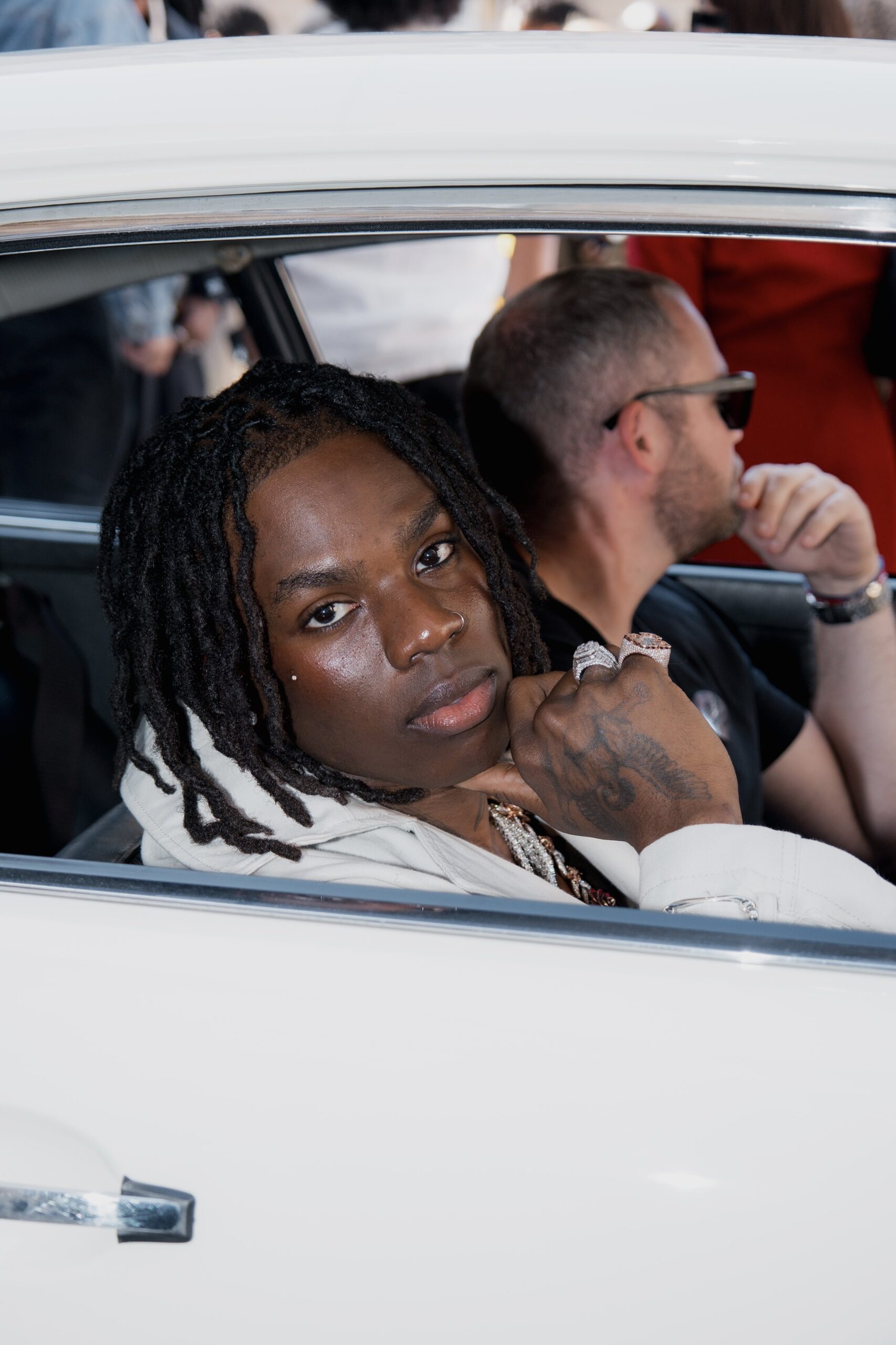
Afrobeats superstar Rema continues to break boundaries—this time in the world of high fashion.
The Nigerian hitmaker made a surprise appearance on the runway at Paris Fashion Week 2025, walking for the highly anticipated 424 x Porsche collaboration show.
SEE VIDEO
Known for his genre-bending music and trendsetting style, Rema brought his charisma to the fashion capital, turning heads as he strutted down the runway in a bold white-and-black tailored ensemble.
A Fusion of Music, Fashion, and Automotive Luxury
The collaboration between 424, the Los Angeles-based streetwear label founded by Guillermo Andrade, and Porsche, the German automotive powerhouse, marked one of the standout moments of Paris Fashion Week. The collection reflected a fusion of street culture and automotive aesthetics, pushing the boundaries of what runway fashion can represent.
Rema’s appearance alongside other notable names like American rapper Roddy Ricch elevated the show’s global appeal, underlining the intersection of music, fashion, and brand storytelling.
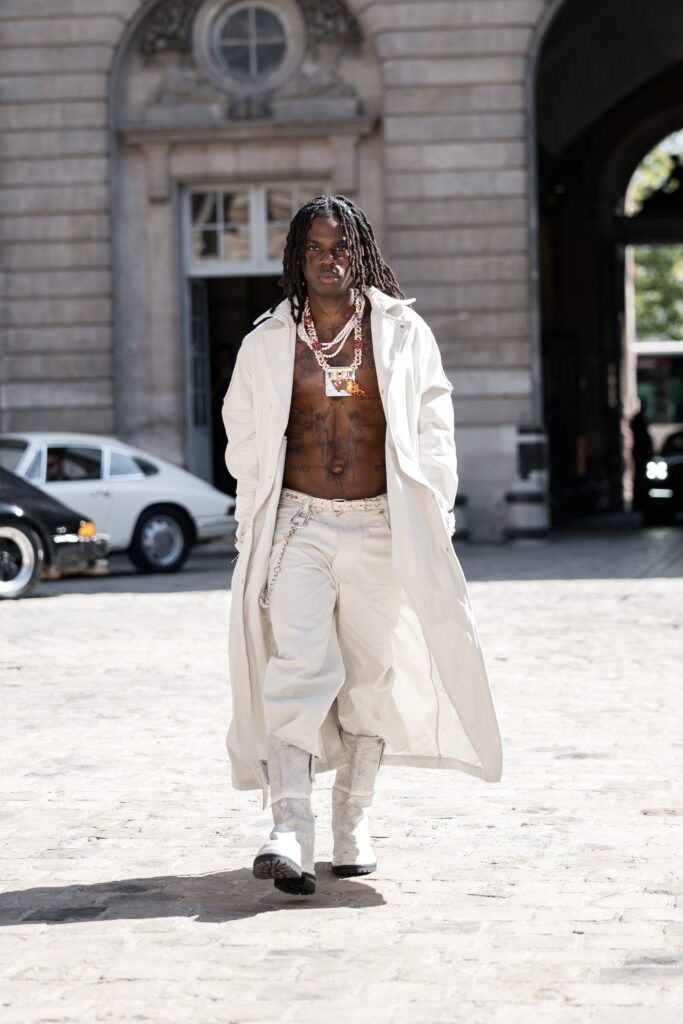
Rema’s Rising Fashion Influence
Rema’s foray into the fashion world is no surprise to those following his rise.
The “Calm Down” crooner has previously attended shows by Louis Vuitton and Kenzo, and now with this runway moment, he’s fast becoming a cultural icon at the center of a creative movement that unites Afrobeats, luxury fashion, and youth culture.
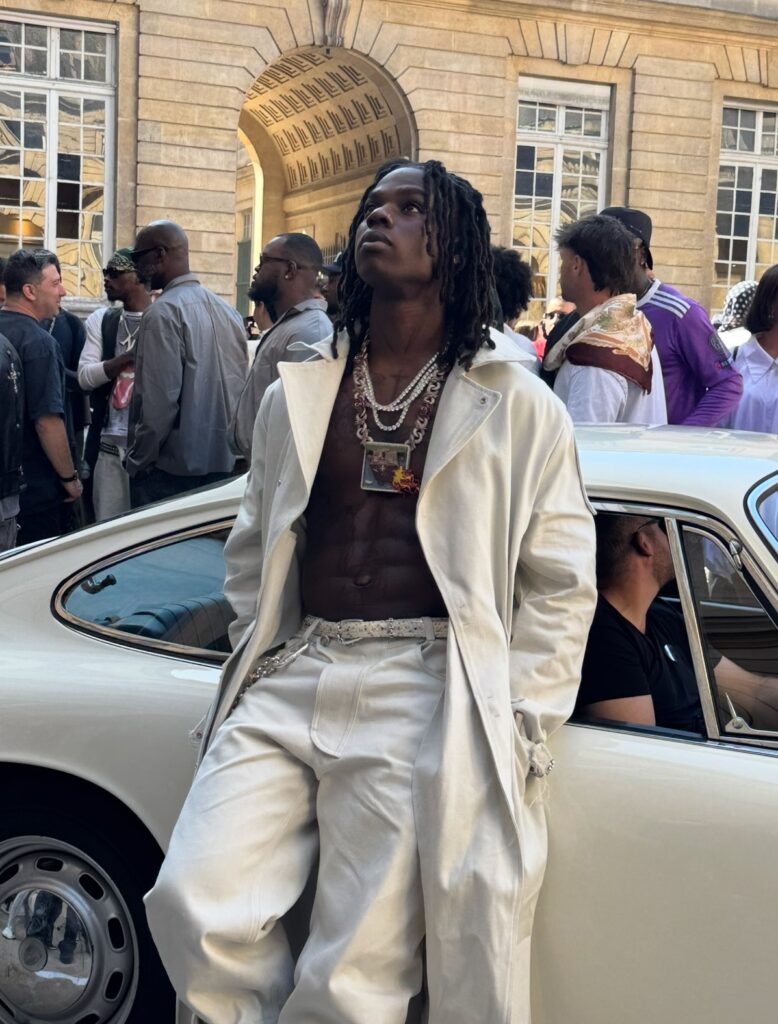
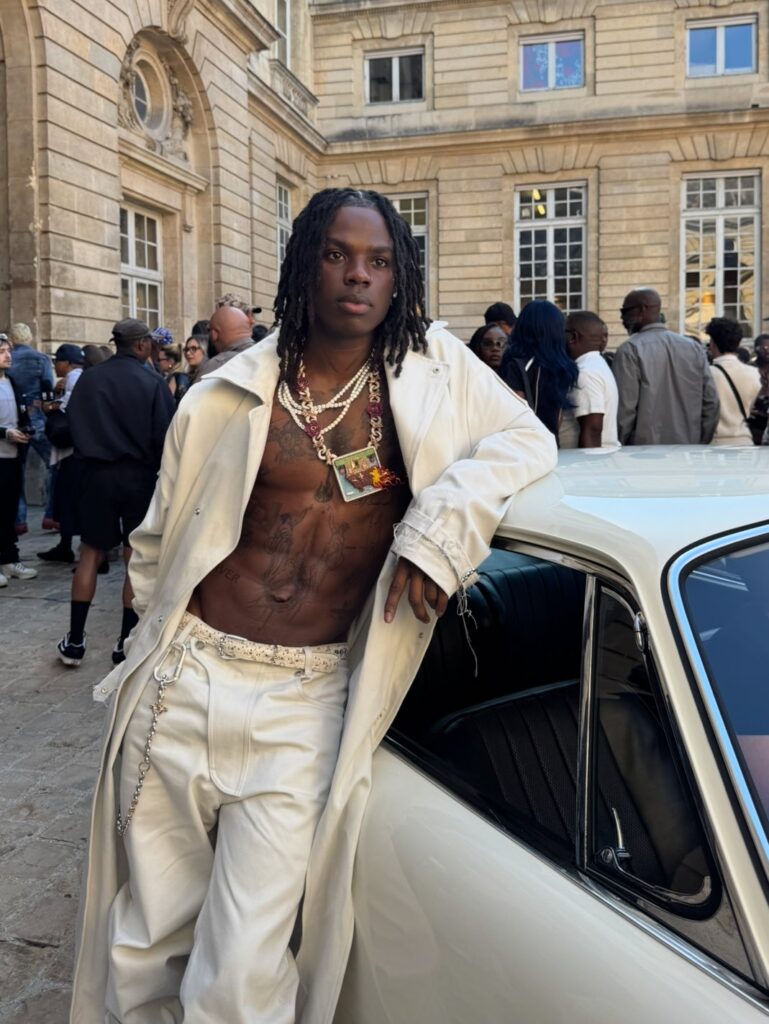
Rema’s runway debut at the 424 x Porsche show at Paris Fashion Week 2025 is a defining moment—not just for his personal brand, but for the growing synergy between music, fashion, and luxury branding.
As Afrobeats continues to take over the world, artists like Rema are proving they have just as much power on the runway as they do on the stage.
Fashion
“We accidentally slept together; do your worst” – Lady replies friend who called her out for ‘borrowing’ her boyfriend and getting pregnant for him

Lady lashes out at a friend who accused her of kidnapping her lover, Obinna, and becoming pregnant for him.
The buddy known as AkwaIgbo Gurl @AkwaigboG on Twitter took to the platform to recount how she met the lady CiCiofLagos at a job interview and they became very close friends.
However, after presenting her to her man, things went wrong, and her buddy became pregnant by her boyfriend.
Read the narrative below.
“I met @CiCiofLagos
2 years ago on one job hunting WhatsApp group. We became close and it skyrocketed into what’s supposed to be genuine friendship.
I got a job in Port Harcourt two months later and moved from Lagos to PH.
READ ALSO
- Nikos Living Releases ‘Call My Name’ Featuring Peruzzi and Young Jonn
- Court Orders Suspension of PDP National Convention Over Lamido’s Exclusion
- Obiano Alive, Former Aide Debunks Death Report of Ex-Anambra Governor
- African Union Rejects Christian Genocide Claims in Nigeria After Trump Threats
- Seyi Vibez Drops Fuji Moto Album Featuring Trippie Redd, French Montana, NLE Choppa & Olamide
Last year there was a job opening in one of our company’s subsidiary with a juicy offer. First thought that came into my head was “Cynthia will want this job”. I immediately called to notify her, which she agreed to send her CV.
Her interview was scheduled for 12th September.
She called to complain about being low on finances & coming over immediately will be a problem. I agreed to pay for her flight so she can be in PH 10th(sunday).
When she landed in Port Harcourt on Sunday, I called my man so we can take her around the city and give her a treat.
I introduced my boyfriend Obinna to her and made sure she was comfortable & had a great time. Sheltered and fed this babe for 3 weeks.
All the while, I had no idea I was wasting my time, food, money and energy on a devil.
Anytime I return from work she’s not at home which was becoming a routine. Confronted & asked about her frequent absence. According to her, she met “a nice guy”.
I can’t police a grown woman, so I told her to be careful & be security conscious because Port Harcourt isn’t safe.
She returned to Lagos in October since she didn’t pass the second phase of the interview.
Our communication reduced and I noticed she was intentionally avoiding me. Anytime I called, she won’t pick or return the calls.
I had to let her be.
Last week, our mutual I met in the same job hunting WhatsApp group posted her introduction pictures. Guess who the husband to be is? My boyfriend!!!
You want to know another joke? She is pregnant!!! PREGNANT!”
However, the friend has responded by stating that the lady never cared about her boyfriend and that whatever happened between them that led to her being pregnant was completely unintentional.
“My junior sister saw your tweets on someone’s Facebook page and called to inform that am been dragged on social media.
You didn’t have to put it here without finding out the whole truth.
I have been feeling bad about the whole issue and trying to look for a better way to address
We accidentally had sex one of the days you went to work and it eventually turned to a love story I can’t wipe off because of friendship. I got pregnant too. You can’t blame me for getting pregnant please. I avoided your calls when I returned to Lagos because of guilt.
Now you’ve posted it for the world to see I don’t care anymore. Do your worst.”
See post below …


Fashion
How Moses Bliss met British lawyer fiancée on Instagram Plus the fab.. proposal

Spotlite Nation boss, Minister Moses Bliss has engaged his girlfriend in an elegant style in London, the United Kingdom.
The ‘Daddy-wey-dey-pamper’ crooner made this in a video post on social media on Friday, January 19.
Interestingly, Moses Bliss met his soon-to-be wife on Instagram where the electrifying love story started, his lawyer, Pelumi Olajengbesi said in a Facebook post.
READ ALSO
- Nikos Living Releases ‘Call My Name’ Featuring Peruzzi and Young Jonn
- Court Orders Suspension of PDP National Convention Over Lamido’s Exclusion
- Obiano Alive, Former Aide Debunks Death Report of Ex-Anambra Governor
- African Union Rejects Christian Genocide Claims in Nigeria After Trump Threats
- Seyi Vibez Drops Fuji Moto Album Featuring Trippie Redd, French Montana, NLE Choppa & Olamide
“Congratulations to my brother, friend, client, and Man of God, Minister @mosesbliss, on his engagement to his beautiful girlfriend,” he wrote.
“Indeed, God is great. Remarkably, Moses Bliss met his wife on Instagram recently, a divine connection affirmed by God.
“She is a beautiful, calm British legal practitioner with Ghanaian descent. Wishing them a lifetime of love and joy!”
Emotional moment ![]() Moses bliss surprise proposal engagement to his love
Moses bliss surprise proposal engagement to his love ![]() in London
in London
Fashion
Outrage as 70yrs old, Francis Van-Lare shares photos of ladies he allegedly slept with since 1970
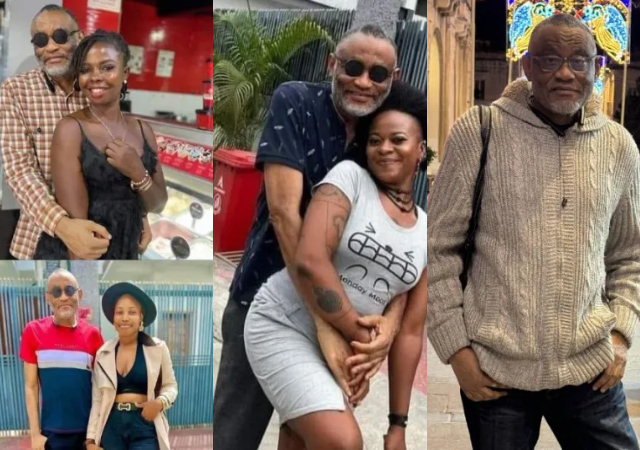
Francis Van-Lare, a 70-year-old Nigerian-American entrepreneur, has kept his promise to share photos of some of the women he claims to have been intimate with.
This is coming after Francis Van-Lare revealed the identities of 219 women with whom he had coitus exercised since 1970.
Keeping true to his statements, he compiled a detailed list of women’s names from various ethnic backgrounds, which he revealed in three batches.
Only a few hours ago, Francis released photos of himself with women he claims to have had intimate relations with, eliciting a wide range of reactions.
He mentioned that more photos are on the way.
See the reactions below.
@_Purple057: I don see my friend mother for there o 🙆♀️
@Oladapomikky1: I’m sorry to say even King Solomon dei learn from this man.😂😂😂.
@KinqKudos: If your babe is here, you have failed as a man.
@KinqKudos: This man don already spoil many relationships.
@maaziossy: He lives in Atlanta, has lots of money, frequents Nigeria alot, loves young ladies, and is known on Facebook to be “randy”. We are Facebook friends and we know how he rolls. He’s often not ashamed of his lifestyle…Man is a something else. Lol.
golddesire_oma: One of this ladies on her birthday post to him said it was a business lunch that the man speak how to invest and a serious minded man and he is not like what he put out there on the media but omo this one come shock me ooooo.
arinola_pearls: This is disgusting.
@Irunnia_: This man wasn’t joking 😂😂.
Fashion
Trending photo of a purported letter a Nigerian man sent to the mother of his pregnant girlfriend
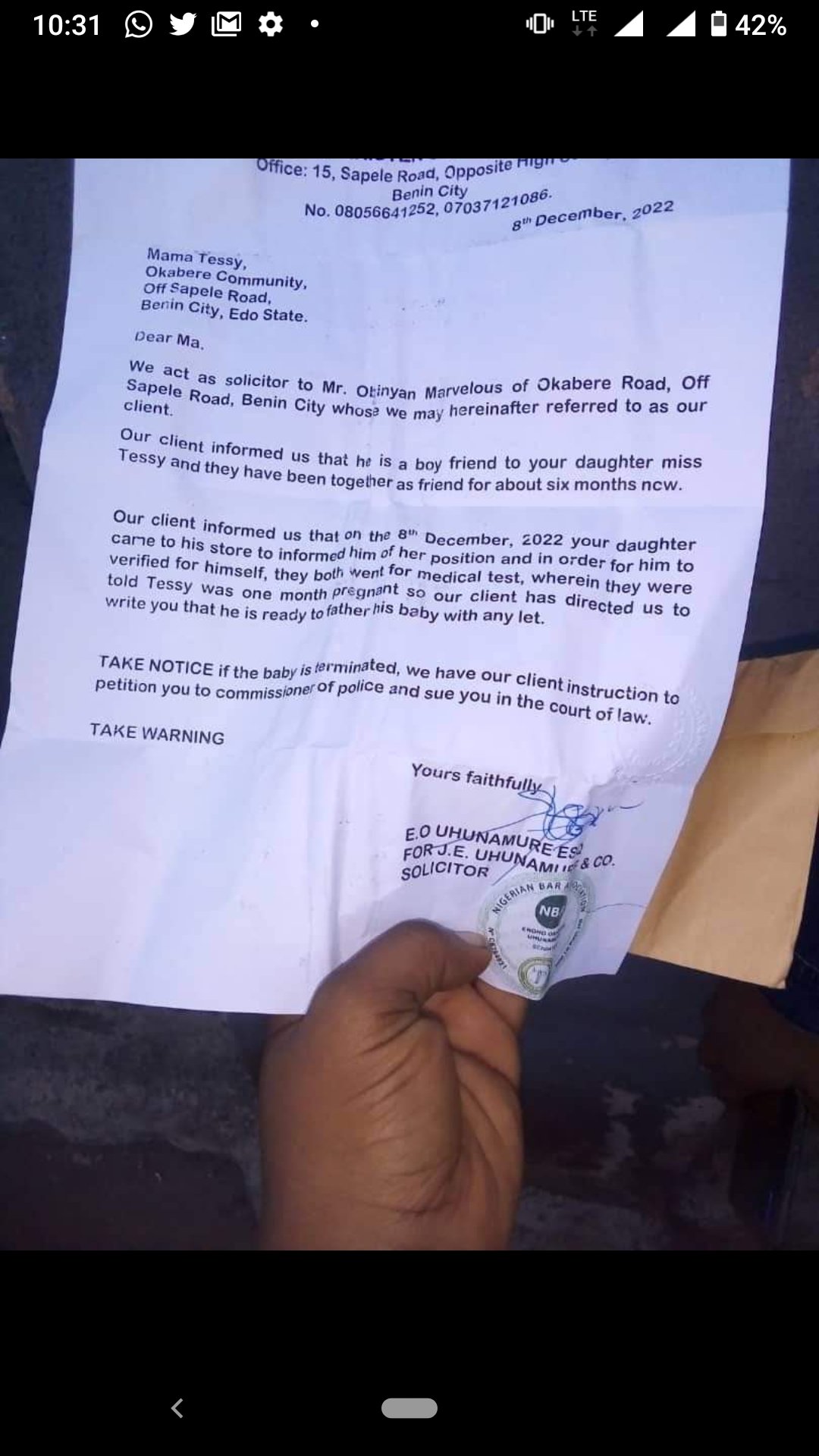
Trending photo of a purported letter a Nigerian man sent to the mother of his pregnant girlfriend warning her against terminating her pregnancy.
A photo of a purported letter a Nigerian man, Obinyan Marvelous, sent via his lawyer to the mother of his pregnant girlfriend, Tessy, warning her against terminating her pregnancy has made the rounds on social media.
In the viral letter, the young man stated that Tessy visited him in his store and informed him that she is pregnant. He said they went for a test and it was confirmed that she was indeed one month gone.
Marvelous stated that he is ready to take up his responsibility and will petition the police and sue his girlfriend’s mum if she gets his girlfriend to terminate the pregnancy.
See the viral letter below:
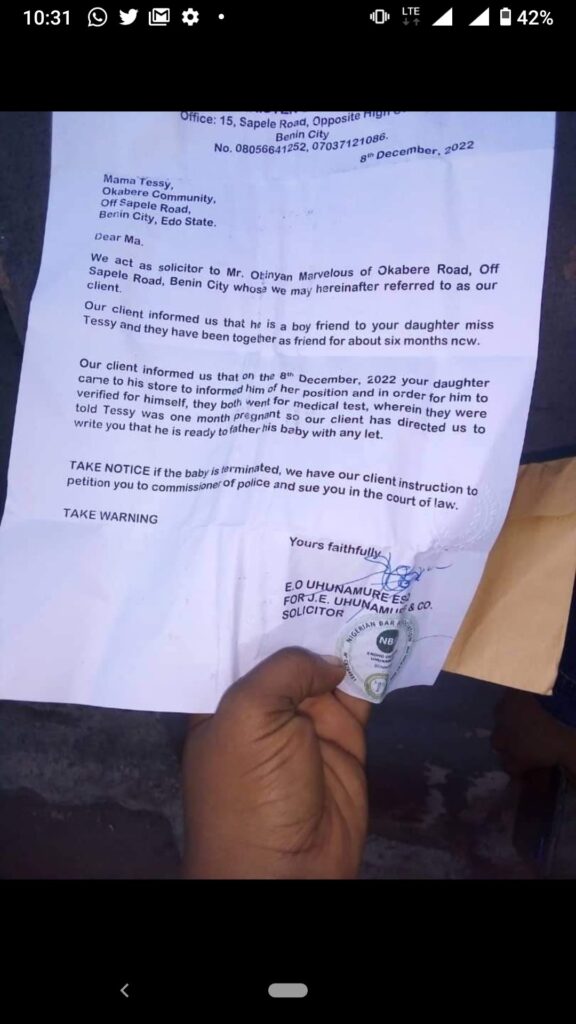
-
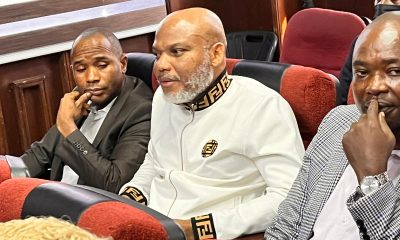
 Abuja3 weeks ago
Abuja3 weeks agoIPOB Leader Nnamdi Kanu Declines to Enter Defence, Insists “No Case” Against Him
-

 Music News3 weeks ago
Music News3 weeks agoFlavour Unveils ‘Afroculture’ Single Featuring Baaba Maal, Directed by TG Omori
-

 Lifestyle3 weeks ago
Lifestyle3 weeks agoNed Nwoko Drops Bombshell, Says ‘Men Marrying Multiple Wives Are Helping Women’
-

 World News3 weeks ago
World News3 weeks agoTwo Killed, Two Injured as Plane Bursts Into Flames After Takeoff Crash in Venezuela
-

 World News2 weeks ago
World News2 weeks agoTrump asks Pentagon to immediately start testing U.S. nuclear weapons
-

 Entertainment3 weeks ago
Entertainment3 weeks agoDavido Kicks Off ‘5ive Alive’ Tour with Sold-Out Uyo Stadium Show
-

 World News1 week ago
World News1 week agoUS Military Submits Contingency Plan for Action in Nigeria
-

 Music2 weeks ago
Music2 weeks agoMusic: Badshah and Davido Launch Cross-Cultural Hit “Wallah Wallah”
-

 News3 weeks ago
News3 weeks agoBREAKING: Tinubu Nominates Dr. Bernard Doro as New Minister from Plateau State
-

 Music3 weeks ago
Music3 weeks agoBritish Rapper Dave Unveils Third Studio Album ‘The Boy Who Played the Harp’



